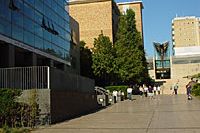|
||||||||||||||||||||||||||
| Information Systems (co-op) - INFSCH3971 | ||||||||||||||||||||||||||
The UNSW Co-op Program is a scholarship program set up by industry and The University of New South Wales to provide financial support and industry training for selected undergraduate students. The UNSW Co-op Program is based on existing undergraduate programs at UNSW with the following special features:
This four Stage program teaches Information Systems Theory and Practice and provides industrial training linked to that teaching. The three industrial training periods in the course are each of approximately six months duration, running from January of Stages 2 and 3, and July of Stage 3 of the program.
The Bachelor of Information Systems Co-op Program offers a more advanced level of coursework, and the chance to develop individual skills working independently on a research project. The program provides a broad exposure to advanced areas in Information Systems as well as a high degree of specialisation that is applicable to a career in industry. The BIS (Co-op) Program is also designed as a preparation for PhD research in Information Systems at both UNSW and leading international research intensive universities. Compulsory Courses:
Plus Stage 2/3 INFS Electives totalling 6 UOC from Table 1
Table 1 Stage 2&3 INFS Electives: Students must also complete:
Table 2 Stage 4 Honours Electives:
Plus required three Industrial Training courses:
Please note that any variation to this program of study requires approval from the Australian School of Business (ASB).
This Program is available only to students admitted through the scholarship selection procedures administered by the UNSW Co-op Program office. The BIS (Co-op) is a four year Honours degree program.
Visit the UNSW Co-op website for more information.
For further information about the Co-op Program and Co-op Scholarships, refer to the Co-op program office
UNSW Co-op Program Office email:cooprog@unsw.edu.au tel: + 61 2 9385 5116 fax: + 61 2 9313 6774 location: Room 1096 Rupert Myers Building (South Wing) (Enter Gate 14 Barker Street) Enter campus Via Gate 11 Botany Street Randwick. Mailing Address: UNSW Co-op Program UNSW Sydney NSW 2052 Please note that these requirements may be subject to change. Students are advised to follow requirements according to the year they commenced. Current students are to refer to previous editions of the Online Handbook for program requirements. Please contact the Business Student Centre for enrolment advice. Business Student Centre e-mail: ugbusiness@unsw.edu.au tel: + 61 2 9385 3189 location: Ground Floor, West Wing, Australian School of Business Building |
||||||||||||||||||||||||||



